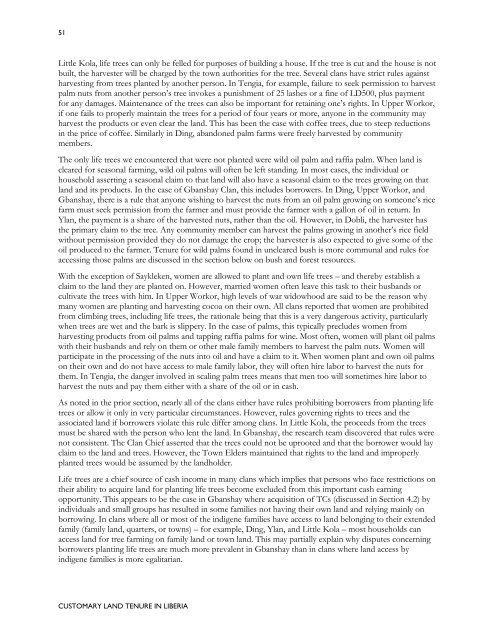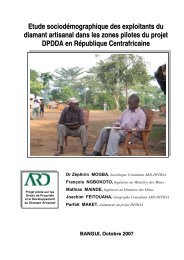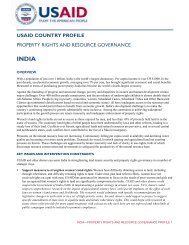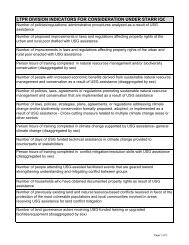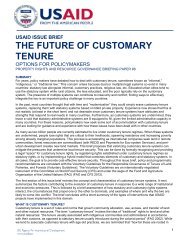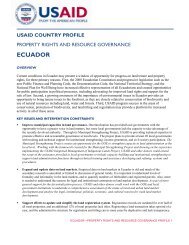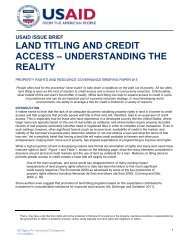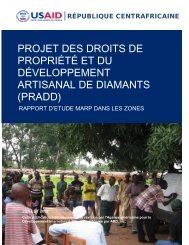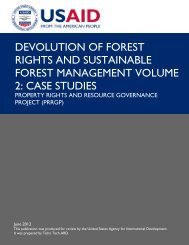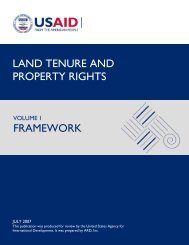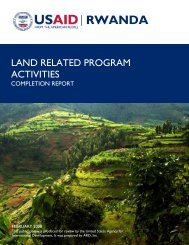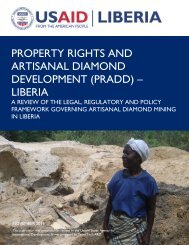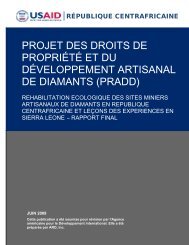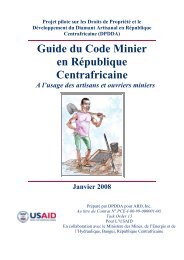Customary Land Tenure in Liberia - Land Tenure and Property ...
Customary Land Tenure in Liberia - Land Tenure and Property ...
Customary Land Tenure in Liberia - Land Tenure and Property ...
You also want an ePaper? Increase the reach of your titles
YUMPU automatically turns print PDFs into web optimized ePapers that Google loves.
51<br />
Little Kola, life trees can only be felled for purposes of build<strong>in</strong>g a house. If the tree is cut <strong>and</strong> the house is not<br />
built, the harvester will be charged by the town authorities for the tree. Several clans have strict rules aga<strong>in</strong>st<br />
harvest<strong>in</strong>g from trees planted by another person. In Tengia, for example, failure to seek permission to harvest<br />
palm nuts from another person‟s tree <strong>in</strong>vokes a punishment of 25 lashes or a f<strong>in</strong>e of LD500, plus payment<br />
for any damages. Ma<strong>in</strong>tenance of the trees can also be important for reta<strong>in</strong><strong>in</strong>g one‟s rights. In Upper Workor,<br />
if one fails to properly ma<strong>in</strong>ta<strong>in</strong> the trees for a period of four years or more, anyone <strong>in</strong> the community may<br />
harvest the products or even clear the l<strong>and</strong>. This has been the case with coffee trees, due to steep reductions<br />
<strong>in</strong> the price of coffee. Similarly <strong>in</strong> D<strong>in</strong>g, ab<strong>and</strong>oned palm farms were freely harvested by community<br />
members.<br />
The only life trees we encountered that were not planted were wild oil palm <strong>and</strong> raffia palm. When l<strong>and</strong> is<br />
cleared for seasonal farm<strong>in</strong>g, wild oil palms will often be left st<strong>and</strong><strong>in</strong>g. In most cases, the <strong>in</strong>dividual or<br />
household assert<strong>in</strong>g a seasonal claim to that l<strong>and</strong> will also have a seasonal claim to the trees grow<strong>in</strong>g on that<br />
l<strong>and</strong> <strong>and</strong> its products. In the case of Gbanshay Clan, this <strong>in</strong>cludes borrowers. In D<strong>in</strong>g, Upper Workor, <strong>and</strong><br />
Gbanshay, there is a rule that anyone wish<strong>in</strong>g to harvest the nuts from an oil palm grow<strong>in</strong>g on someone‟s rice<br />
farm must seek permission from the farmer <strong>and</strong> must provide the farmer with a gallon of oil <strong>in</strong> return. In<br />
Ylan, the payment is a share of the harvested nuts, rather than the oil. However, <strong>in</strong> Dobli, the harvester has<br />
the primary claim to the tree. Any community member can harvest the palms grow<strong>in</strong>g <strong>in</strong> another‟s rice field<br />
without permission provided they do not damage the crop; the harvester is also expected to give some of the<br />
oil produced to the farmer. <strong>Tenure</strong> for wild palms found <strong>in</strong> uncleared bush is more communal <strong>and</strong> rules for<br />
access<strong>in</strong>g those palms are discussed <strong>in</strong> the section below on bush <strong>and</strong> forest resources.<br />
With the exception of Saykleken, women are allowed to plant <strong>and</strong> own life trees – <strong>and</strong> thereby establish a<br />
claim to the l<strong>and</strong> they are planted on. However, married women often leave this task to their husb<strong>and</strong>s or<br />
cultivate the trees with him. In Upper Workor, high levels of war widowhood are said to be the reason why<br />
many women are plant<strong>in</strong>g <strong>and</strong> harvest<strong>in</strong>g cocoa on their own. All clans reported that women are prohibited<br />
from climb<strong>in</strong>g trees, <strong>in</strong>clud<strong>in</strong>g life trees, the rationale be<strong>in</strong>g that this is a very dangerous activity, particularly<br />
when trees are wet <strong>and</strong> the bark is slippery. In the case of palms, this typically precludes women from<br />
harvest<strong>in</strong>g products from oil palms <strong>and</strong> tapp<strong>in</strong>g raffia palms for w<strong>in</strong>e. Most often, women will plant oil palms<br />
with their husb<strong>and</strong>s <strong>and</strong> rely on them or other male family members to harvest the palm nuts. Women will<br />
participate <strong>in</strong> the process<strong>in</strong>g of the nuts <strong>in</strong>to oil <strong>and</strong> have a claim to it. When women plant <strong>and</strong> own oil palms<br />
on their own <strong>and</strong> do not have access to male family labor, they will often hire labor to harvest the nuts for<br />
them. In Tengia, the danger <strong>in</strong>volved <strong>in</strong> scal<strong>in</strong>g palm trees means that men too will sometimes hire labor to<br />
harvest the nuts <strong>and</strong> pay them either with a share of the oil or <strong>in</strong> cash.<br />
As noted <strong>in</strong> the prior section, nearly all of the clans either have rules prohibit<strong>in</strong>g borrowers from plant<strong>in</strong>g life<br />
trees or allow it only <strong>in</strong> very particular circumstances. However, rules govern<strong>in</strong>g rights to trees <strong>and</strong> the<br />
associated l<strong>and</strong> if borrowers violate this rule differ among clans. In Little Kola, the proceeds from the trees<br />
must be shared with the person who lent the l<strong>and</strong>. In Gbanshay, the research team discovered that rules were<br />
not consistent. The Clan Chief asserted that the trees could not be uprooted <strong>and</strong> that the borrower would lay<br />
claim to the l<strong>and</strong> <strong>and</strong> trees. However, the Town Elders ma<strong>in</strong>ta<strong>in</strong>ed that rights to the l<strong>and</strong> <strong>and</strong> improperly<br />
planted trees would be assumed by the l<strong>and</strong>holder.<br />
Life trees are a chief source of cash <strong>in</strong>come <strong>in</strong> many clans which implies that persons who face restrictions on<br />
their ability to acquire l<strong>and</strong> for plant<strong>in</strong>g life trees become excluded from this important cash earn<strong>in</strong>g<br />
opportunity. This appears to be the case <strong>in</strong> Gbanshay where acquisition of TCs (discussed <strong>in</strong> Section 4.2) by<br />
<strong>in</strong>dividuals <strong>and</strong> small groups has resulted <strong>in</strong> some families not hav<strong>in</strong>g their own l<strong>and</strong> <strong>and</strong> rely<strong>in</strong>g ma<strong>in</strong>ly on<br />
borrow<strong>in</strong>g. In clans where all or most of the <strong>in</strong>digene families have access to l<strong>and</strong> belong<strong>in</strong>g to their extended<br />
family (family l<strong>and</strong>, quarters, or towns) – for example, D<strong>in</strong>g, Ylan, <strong>and</strong> Little Kola – most households can<br />
access l<strong>and</strong> for tree farm<strong>in</strong>g on family l<strong>and</strong> or town l<strong>and</strong>. This may partially expla<strong>in</strong> why disputes concern<strong>in</strong>g<br />
borrowers plant<strong>in</strong>g life trees are much more prevalent <strong>in</strong> Gbanshay than <strong>in</strong> clans where l<strong>and</strong> access by<br />
<strong>in</strong>digene families is more egalitarian.<br />
CUSTOMARY LAND TENURE IN LIBERIA


